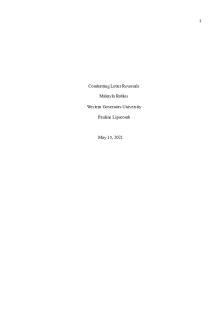Prospectus - Michael Yoo PDF

| Title | Prospectus - Michael Yoo |
|---|---|
| Author | Michael Yoo |
| Course | Topic Ancient Greek Philosophy |
| Institution | Emory University |
| Pages | 3 |
| File Size | 79.4 KB |
| File Type | |
| Total Downloads | 76 |
| Total Views | 126 |
Summary
paper outline and intro ...
Description
Michael Yoo Jeremy Bell Philosophy 400 April 10, 2018 Prospectus Paper Topic: To examine and explain the relationship between the good, being virtuous and just, the health of one’s soul, and human happiness as found in the Socratic dialogues, but especially the Alcibiades and the Gorgias.
Working Introductory Paragraph: Many, if not most of Plato’s Socratic dialogues revolve around the themes of the soul, virtue, wisdom, and happiness. Socrates’ famous saying, “The unexamined life is not worth living” is a call to serious reflection about one’s beliefs regarding these things, earnest investigation into, and thoughtful contemplation upon those things which contribute to a good and meaningful life, in order that one may live in accordance therewith. In his day—as is probably the case in ours as well—nothing was more common than for Socrates to find people more concerned with their bodies, their wealth, their reputation, their political prowess, and their comfort, than their souls. This, however, as far as Socrates is concerned, is a fundamental mistake. Those things do not produce in the soul those virtues which are essential to true human happiness (eudaimonia) and flourishing. The purpose of this paper is to examine and explain the relationship between the good, , the health of one’s soul, being virtuous and just, and human
happiness as found in the Socratic dialogues, but especially as found in the Alcibiades and the Gorgias.
Outline: 1. Introduction 2. What is the problem? 3. What is the good? a. An explanation of what Socrates means when he says “the good” b. Where does this “good” come from? 4. Why is the health of the soul so important? a. First, what is the soul? Is it the seat of the virtues? b. What does it mean to have a healthy soul? c. Why is the care of the soul just as, if not more important than the body? 5. Virtue and justice a. Are all virtues one, or are there many virtues? b. Is justice the seat of all virtues? c. How does being virtuous and doing justice lead to a healthy soul? d. Why is it better to be the victim of injustice than to commit injustice? 6. Happiness a. Is it possible to be happy without being virtuous? That is, without a healthy soul? b. Does virtue always lead to happiness? Even when suffers unjustly for its sake? See above.
c. Is virtue identical to happiness itself? Is it merely a part of happiness? Or is it a necessary, yet perhaps insufficient condition for happiness? d. Can happiness consist with doing evil if doing so contributes to what one views as one’s own good and advantage? 7. Conclusion...
Similar Free PDFs

Prospectus - Michael Yoo
- 3 Pages

Essay Assignment 1 - Michael Yoo
- 3 Pages

Prospectus COMM 3710
- 3 Pages

Sponsorship Prospectus
- 12 Pages

Mbaoff-prospectus 2020
- 23 Pages

UJ Prospectus 2020 Online
- 51 Pages

Prospectus - It is good
- 52 Pages

Ufs postgraduate prospectus 2022
- 34 Pages

Capstone. Task 1. Prospectus
- 16 Pages

CPUT Prospectus 2021
- 2 Pages

Liverpool Medicine Prospectus
- 24 Pages

Prospectus Template Saunders
- 9 Pages

Sample 1-Yoo Burger - Good Project
- 14 Pages

Unit 2 prospectus company law
- 8 Pages
Popular Institutions
- Tinajero National High School - Annex
- Politeknik Caltex Riau
- Yokohama City University
- SGT University
- University of Al-Qadisiyah
- Divine Word College of Vigan
- Techniek College Rotterdam
- Universidade de Santiago
- Universiti Teknologi MARA Cawangan Johor Kampus Pasir Gudang
- Poltekkes Kemenkes Yogyakarta
- Baguio City National High School
- Colegio san marcos
- preparatoria uno
- Centro de Bachillerato Tecnológico Industrial y de Servicios No. 107
- Dalian Maritime University
- Quang Trung Secondary School
- Colegio Tecnológico en Informática
- Corporación Regional de Educación Superior
- Grupo CEDVA
- Dar Al Uloom University
- Centro de Estudios Preuniversitarios de la Universidad Nacional de Ingeniería
- 上智大学
- Aakash International School, Nuna Majara
- San Felipe Neri Catholic School
- Kang Chiao International School - New Taipei City
- Misamis Occidental National High School
- Institución Educativa Escuela Normal Juan Ladrilleros
- Kolehiyo ng Pantukan
- Batanes State College
- Instituto Continental
- Sekolah Menengah Kejuruan Kesehatan Kaltara (Tarakan)
- Colegio de La Inmaculada Concepcion - Cebu

